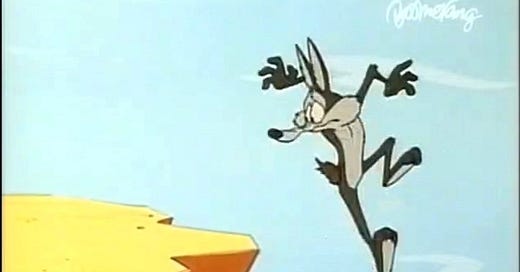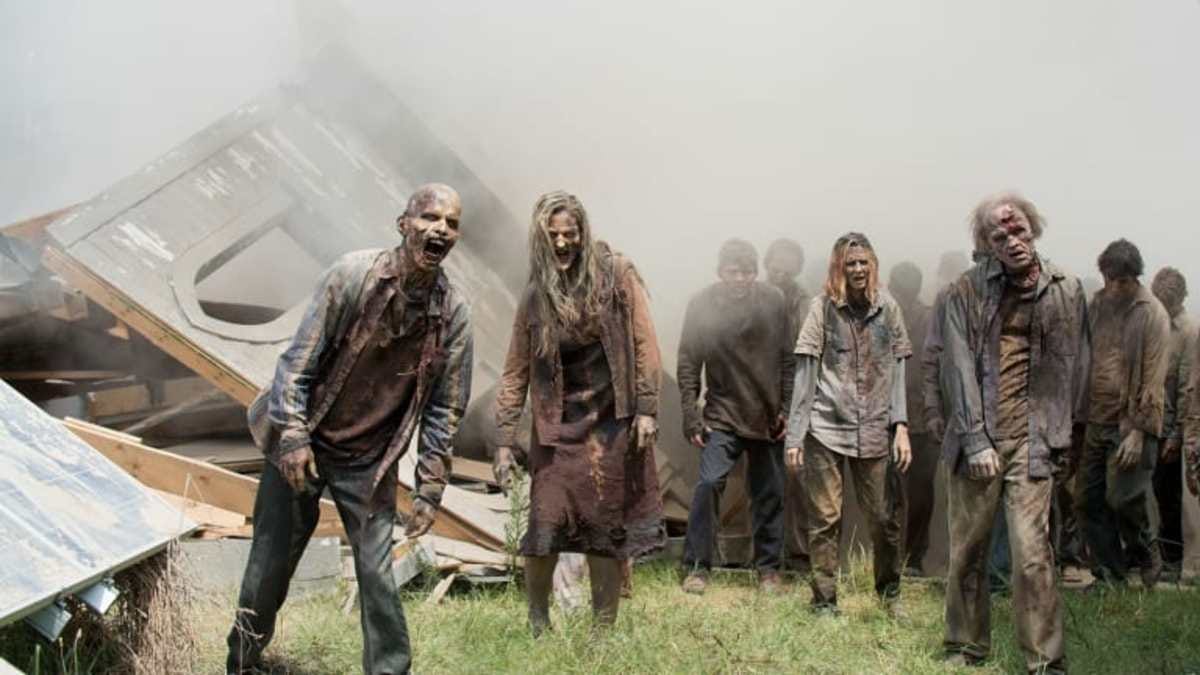I’d planned to do a monthly round-up of Deadline articles that might point us to prevailing trends and state-of-the-industry briefings, but, honestly, it’s just too much. Things are bad. Things have been bad. And things will get worse.
The TV and film industry has always been volatile. There have never been “normal times.”
But since 2019 and the WGA’s Agency Campaign, that instability has been faster and more seismic. The nearly two-year long Agency Campaign (if you’re unfamiliar, you can read more here) was absolutely a game-changer in regards to aligning the big agencies’ interests with those of the writers they represent. Because of various sunset clauses and so forth, we’re still waiting to see the most tangible effects of the campaign, but I cannot think it will be anything but a net positive for writers.
Here’s a Deadline article that’s a good encapsulation of the WGA’s gains.
Shifting Landcape
The Campaign was a scary time for many writers, especially those who were just breaking in or about to, but I think overwhelmingly the writing community pulled together to fill—and improve upon—the void left by our absent agents. There was a new directness with execs who seemed eager for the unfettered access they were getting to writers. And, most exciting, I saw writers lift each other up on social media and behind the scenes. I still have a folder of scripts that I read for the #WGASolidarityChallenge that I send out to friends who might be looking to staff newer writers.
But the Agency Campaign felt like the first tremors of a non-stop instability that has throttled the industry, leaving most of us uncertain about who’s buying, what’s being made, how staffing works any more, and where work will come from. While unpredictability has always been a part of the industry, there would also be moments of reprieve, when things stabilized enough for long enough that you could, you know, sell a show to USA because USA was making light procedurals.
Since 2019, it’s been one thing after another, the sands beneath us constantly shifting so that we’re all Kevin Bacon in Tremors:
The pandemic was part of it, of course, but in the years preceding Covid we’d already seen show orders being cut from 13 to 10 to 8 and now, frequently, to 6. We’ve seen the average lifespan of a cable or streaming show go from 3-5 years to 1-2 years. Limited series have taken the place of longer-running “prestige” series. Shorter orders mean fewer weeks of a writers’ room, which means smaller rooms. Which means that the writing is done before production starts, which means that lower level writers, often in their first rooms, often non-white writers, don’t get production experience. An entire population of future showrunners are not being given the opportunity to learn their craft and trade. As Genny Hutchison put on Twitter recently:

Additionally, smaller rooms means that (predominantly white) showrunners are going to hire their (predominantly white) upper level friends to be in their rooms, because they need people who are tried and true and can get the work done. Then, with the remaining budget, they will (hopefully) hire some (likely one) staff-level writers (who will probably wind up repeating staff-level for several years because it’s the only way to keep a foot in). So, with their 2-3 upper level pals and the 1-2 staff writer hires, the budget is gone for mid-level writers. As my friend Shawna Benson put it in an honest and even-handed thread this summer:

On top of all of this, the mergers and tech companies have created even more uncertainty. (“Even less certainty?” I don’t even trust my own writing any more). Fox/Disney has made things complicated for Disney+/Hulu/ABC execs to know who their bosses are, let alone what their bosses want. The Netflix bubble, which we thought had a few more years, has burst. Apple+ is spending money, but on what? And now we’re contending with tectonic shake-ups with Warner Brothers/Discovery, of which we’re just seeing the beginnings.
Our Legs Out From Under Us
This week’s news about Warner Brothers shutting down their Writing and Directing Workshops (as well as their digital division), followed by lay-offs of 26% OF THEIR WORKFORCE, is only the beginning.
The Warner Bros TV Workshop has been instrumental to opening the door for a generation of TV creators, showrunners, and writers. Like the Disney/ABC Writing Program, The FOX Writers Incubator, and NBCU’s Launch TV Writers Program (formerly Writers on the Verge), the WB Workshop was a kind of selective equalizer for people breaking in. Over the past decade, I’ve heard dozens of stories from writers who would have been unable to break into television without it.
Nora Zuckerman, who, with her sister and writing partner Lilla Zuckerman, is currently running Poker Face for Peacock, says, “our biggest break is the Warner Brother’s workshop, and I recommend it to everybody who is aspiring, whether in comedy or drama television writer. That was the single most important thing that we did. It’s a fantastic program. It’s truly based on getting you in the business, and getting you in a room.”
These fellowships take the time to introduce writers who might otherwise have no knowledge to how the industry functions. Natalie Chaidez (creator of Hunters; co-showrunner of The Flight Attendant) says, “My god I was terrified of Hollywood, I had no idea what I was getting into. I'd never seen a television script!” Chaidez went through the Disney Writing Program which, she says, “absolutely opened the door for me and I would not have my career” without it.
The studio and network writing programs do more than just open doors, though. As Lilla Zuckerman elaborates:
The most valuable thing the WB Program did for us was to give us a community of peers. So while we were staff writers, we had other staff writers on other staffs that we would go out and get drinks with together and tell war stories and support each other. We would read each other’s pilots and give each other notes… Some of my best friends a people I met in the Warner Brothers program, and a lot of them are kicking ass and doing amazing work right now.
LaToya Morgan (creator of the upcoming Duster) sums perfectly sums up what the loss of the WB Program means in this Hollywood Reporter article, which does a good job illustrating the importance of the program to its alumni and to the industry.
It is the gold standard… That’s an opportunity that some future amazing storyteller won’t get now, to come up with your crew of folks who are going to have your back because you came up together.
Look. I know it’s foolish to think that the studios ever gave any shits about us. But there was at least a time when it felt like companies would keep programs like these around because it provided a ready pipeline of fresh brains; it was a mutually beneficial situation.
All of it—the mergers, the streamlining—signals that things are going to become harder before they become easier. I tend to look at other industries for models as to how ours will go. I think music is usually about 15 years ahead of TV/film, and comics are usually about ten years ahead. This goes for trends both cultural (which I’ll write about in the future) and business-related. We saw the music industry crater with the advent of new technology and corporate mergers, only to re-emerge by embracing new technology (streaming) and understanding that, sorry, there’s no money in this business any more, not like there was. Comics underwent a similar deflation as they become increasingly corporatized and risk-averse, only to refuse to die as new ways of getting comics into fans’ hands, and the importance of IP, have emerged.
And I think that’s the main problem that’s going to plague the next few years of trying to make TV and film. The companies who pay to make these things have never embraced risk, but sometimes people and projects slip through. And, until recently, those were the sometimes paradigm-changing hits: The Sopranos, Mad Men, The Walking Dead (yes! This show was a risk for AMC at the time!), Stranger Things, Pose, Fleabag, Breaking Bad, even Iron Man when it was first developed was a risk.
Not to mention that hiring “new voices”—read: not white men who have been around for forty years—is considered a “risk.” And with companies less likely than ever to put their money on the line for something that isn’t “proven,” isn’t exactly like The Thing They’re Copying Because That Thing Was a Big Hit for Someone Else, isn’t a person who has been given the opportunity to prove themselves, well… I don’t feel fine.
Breaking News!
Madness. Even as I was writing this newsletter, this story emerged on Deadline:
Great news! The Program won’t have the money or personnel that it used to, I’m sure, but it will survive. And that’s good. Get your specs ready.
But, really, this doesn’t change my larger point. The industry is less stable and more conservative than it’s ever been (probably, I don’t know, I’m not a historian), and that’s going to make things increasingly difficult for any of us who want to create for a living.
I don’t want to end on such a bummer note, so here is a list of fellowships and writing programs, with links and deadlines. Get going. If you can write, then there are these cracks in the fortress through which you might slip. Do it before they seal them up again.
Fine, Here’s Something Fun
My friend Marc Evan Jackson has put on a yearly “Total Forking Shirt Show” to benefit his charity, the Detroit Creativity Project. It’s a ridiculously fun improv show featuring cast members from the shows on which Marc has worked, including The Good Place, Brooklyn 99, and more. This year’s show features Nick Offerman, Jason Mantzoukas, Tim Meadows, Nicole Byer, and more!
If you’re in LA, come on out on Sat, October 22, at the Theater at the Ace Hotel.
Okay, that’s it. I gotta go lie down.








